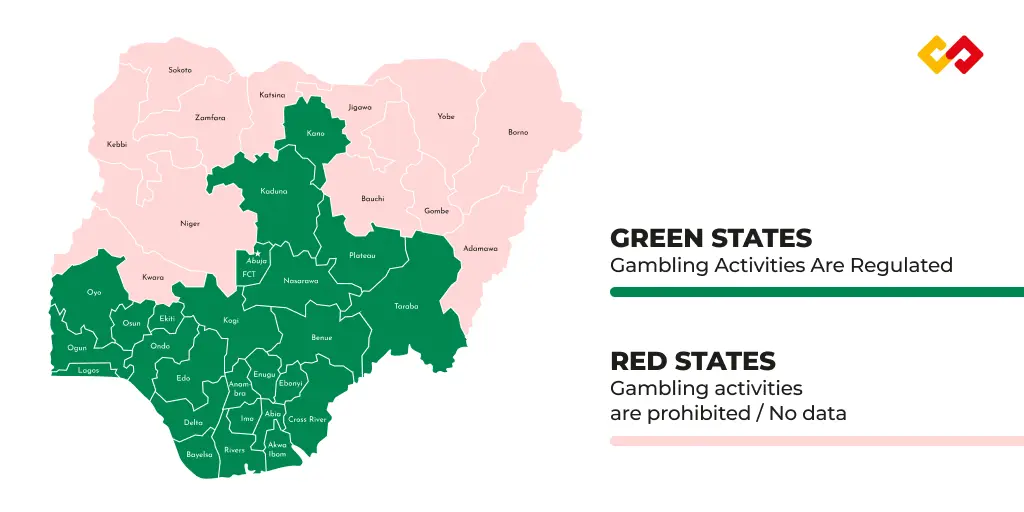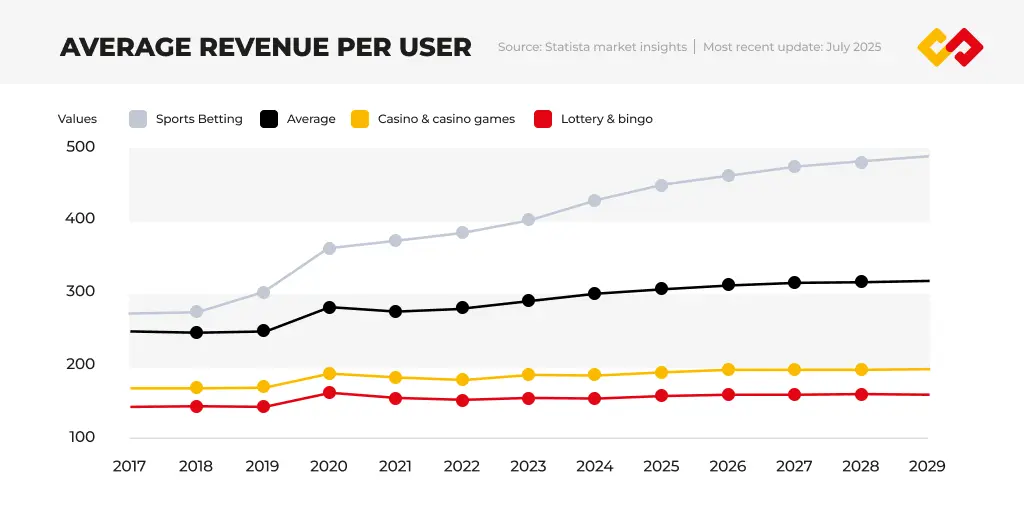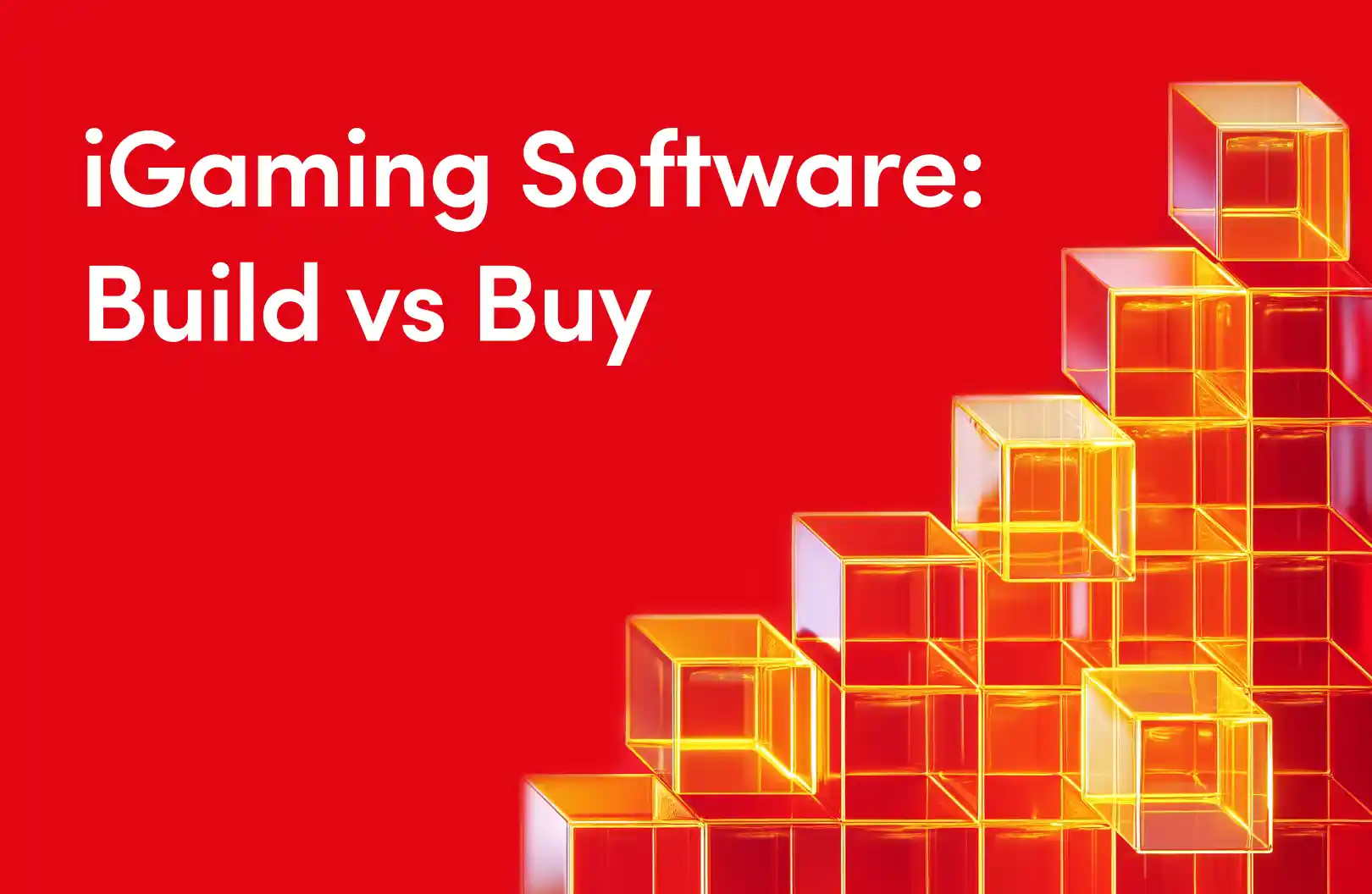Launching an online casino or expanding into a new market always requires careful preparation. Success depends on understanding local regulations, player behaviour, and the technical and compliance standards that shape the iGaming landscape.
This guide empowers operators with the insights and tools to enter and thrive in Nigeria’s vibrant and ever-changing iGaming landscape.
Key Takeaways
- Online gambling in Nigeria is legal and regulated under a state system. It means that operators must treat each state as its own market.
- Nigeria's fast-growing iGaming sector is driven by mobile adoption, urbanisation, and fintech innovations.
- Sports betting significantly dominates the market, followed by slots, poker, and roulette.
- Fair play, data protection, Responsible Gambling, AML/KYC compliance, and adherence to advertising rules are fundamental requirements. Working with certified software providers makes compliance easier.
- Payment methods: users prefer bank transfers, USSD (Unstructured Supplementary Service Data), local mobile wallets (like Paga, OPay, PalmPay), and cryptocurrencies.
- Marketing focuses on mobile optimisation, SEM, social media, affiliate marketing, and influencer partnerships, especially in sports betting.
Is Online Gambling Legal in Nigeria?
Yes – online gambling is legal in Nigeria, provided the operator holds the appropriate licence(s). It is essential to note here that the licensing system in this country has recently undergone notable changes. Following the Supreme Court ruling in late 2024, regulatory powers were transferred to individual states. It means that each state issues its own separate gambling licence if it permits such activity within its territory.
Note: Northern states governed by Sharia law (e.g., Kano, Sokoto, Zamfara, and others in the northwest and northeast) generally prohibit gambling as it conflicts with Islamic principles. These states do not issue gaming licences and impose penalties for related activities.
In a country divided into 36 states, meeting the new requirements may raise concerns. In response, the Federation of State Gaming Regulatory Authorities of Nigeria (FSGRN) was established. It introduced the Universal Reciprocity Certificate (URC) (or, in some sources, the Universal Reciprocity Licence (URL)), a unified national gambling licence. An operator holding a URC may legally offer gambling products across all member states without requiring separate permits at the state level.

Nigeria’s iGaming Boom: Market Overview
Nigeria’s iGaming market began to emerge in the early 2000s and has gained a strong position over the past decade, fuelled by steady economic growth and rapid urbanisation. The country’s gambling industry is projected to reach 21.8 million users by 2029. While this figure includes both online and offline activities, it highlights the extent of demand. With nearly one in five adults already engaging in online gambling, the digital segment is the key driver of growth.
Over the past decade, the expansion of smartphones and mobile broadband has brought online casinos within reach of a much broader audience in Nigeria. This shift is especially significant in a country of more than 220 million people, where access to land-based casinos remains limited. The most well-known venue is in Lagos, Nigeria’s most populous city and economic hub, but with over 70% of Nigerians living outside the city, such establishments remain inaccessible to the majority.
At the same time, clearer licensing frameworks have enhanced legitimacy, strengthened consumer protection, and fostered a more welcoming environment for investment and new market entrants. Also, the rapid growth of fintech innovations, mobile payment systems, and digital banking has made the deposit and withdrawal processes easier.
Popular Types of Online Gambling in Nigeria
Sports betting is the dominant force in Nigeria’s iGaming landscape, engaging around 65% of the population. Football drives most of this activity – betting is a way for fans to turn their game knowledge into profit. Platforms aiming to appeal to Nigerian players should offer comprehensive coverage, spanning local league fixtures to major international tournaments, reflecting the diverse interests of bettors.
To help operators seize this opportunity, the SOFTSWISS Sportsbook, fully certified for use in Nigeria, ensures complete regulatory compliance, an extensive pre-match and live betting offering, and seamless integration with any casino platform. This solution allows operators to deliver a fully localised experience for Nigerian players.
Beyond sports betting, online casino games are steadily expanding their audience. Slots lead the way thanks to their accessibility and variety, followed by table games such as roulette and blackjack. Lotteries also hold a strong position in the market, appealing to players seeking quick, low-stakes entertainment. Poker and fantasy sports represent smaller but active communities, often attracting more experienced users who value strategy and competition.
Meanwhile, new categories such as crash games and esports betting are emerging, particularly among younger audiences seeking fast-paced, skill-oriented gameplay. These trends illustrate that operators who offer both traditional favourites and innovative formats are best positioned for growth.

User Behaviour
Over the last few years, gambling has become a mainstream leisure activity in Nigeria. Data from 2024 indicate that 36% of adults have gambled, and over half (53%) do so on a daily basis. As mentioned before, sports betting is the dominant form of engagement, with some reports indicating that 52% of adults have placed sports wagers in 2024. The consistent and frequent use of this form of entertainment highlights the market's potential and provides scope for sustained growth.
How to Get a Gambling Licence in Nigeria?
An entrepreneur must obtain the proper gambling licence to operate in Nigeria legally, which requires following state-specific regulations. The industry is strictly regulated to protect players, ensure fair play, and maintain financial transparency. Sound preparation is an essential step here.
Current Licensing Options in Nigeria
Although Nigeria’s gambling regulation landscape is complex, the regulatory framework offers clear pathways for legal operation. Currently, there are two primary licensing options available to operators.
| Characteristics | Individual State Licence | Universal Reciprocity Certificate (URC) |
| What Is It | Licence issued by a specific state’s regulatory authority (e.g. National Lottery Regulatory Commission (NLRC), Lagos State Lotteries and Gaming Authority, Oyo State Gaming Board). | A unified licensing framework was introduced in May 2025 by the FSGRN, which is valid across 22 member states. |
| When to Choose | Best suited for operators focusing on a single state (e.g. online platform targeting only Lagos residents). | Best for operators planning multi-state operations or nationwide online gambling services, as it simplifies compliance. |
| Key Details | As of November 2025, at least 12 of Nigeria’s 36 states have established their own gambling regulators. Other states may have regulatory frameworks, but specific details are not publicly documented.
Each state sets its licensing requirements. Standard requirements typically include company incorporation with the Corporate Affairs Commission (CAC), a minimum share capital, and application fees. Operators must also follow the state's tax rules where they are licensed. A licence is only valid in the issuing state; operators expanding to other states must obtain additional licences. |
The FSGRN processes applications in collaboration with state regulators.
Core requirements include CAC registration, provision of financial guarantees, and compliance with Responsible Gambling and anti-money laundering (AML) standards. Even with a URL, operators must meet each participating state's tax and reporting obligations. Former NLRC licence holders can transition to a URC without paying licence fees in 2025, but standard fees will apply from 2026 onwards. The URC is only valid in states that have opted into the framework, so operators must confirm participation before expanding. |
Licensing Costs
A Lagos State sports betting licence and an NLRC online casino licence each cost about €120,000, with an application fee of around €2,400. A national lottery licence costs approximately €12,000. All licences are valid for five years.
The fee under the new URC system is expected to be €56,600 per year per vertical (sports betting, casino, or lottery), with no distinction between online and retail operations.
Separate state licences will remain available, allowing operators to continue applying directly at the state level if they prefer to operate within a specific jurisdiction.
Gambling Taxation in Nigeria
Gambling taxation in Nigeria currently varies by state and at the federal level. In Lagos, operators pay a 2.5% turnover tax on stakes, in addition to other local levies. At the federal level, the 2022 Finance Act introduced a 10% tax on player winnings, requiring bettors to pay 10% of any winnings from lottery or sports betting to the government. Although enforcement has been challenging, many licensed operators now deduct the tax directly from player payouts. Additionally, operators are subject to a 30% corporate income tax on their profits.
Under the new regulatory framework, Nigeria is planning to introduce a flat 11% tax on Gross Gaming Revenue (GGR), applicable to all verticals – lottery, sports betting, and casino.
Technology and Compliance: What Operators Need to Know
A licence is the first and fundamental step when starting an iGaming business, but the tech stack also holds significant weight. To operate legally and build player trust, platforms must meet strict technical and compliance standards. Partnering with an iGaming technology provider that delivers proven solutions would be a prudent choice.
Fair play is the cornerstone of a successful iGaming operation. Certified random number generators (RNG), transparent reporting, and reliable game outcomes are essential for maintaining trust. With the SOFTSWISS Game Aggregator, operators gain access to thousands of certified titles through a single integration, ensuring both variety for players and adherence to Nigerian regulatory standards.
Data protection and cybersecurity are equally critical. Nigerian law requires strict measures to secure players' data, from encryption to controlled access. These requirements are met most effectively with proven solutions. The SOFTSWISS suite of Managed Services supports operators in strengthening security and improving player and anti-fraud support.
Responsible Gambling is not an optional extra but also a core obligation. Tools such as self-exclusion systems, deposit limits, and age verification must be embedded within the platform. The Casino Platform by SOFTSWISS, certified in Nigeria, integrates these features as standard, enabling operators to protect players without compromising user experience.
Anti-money laundering and know-your-customer obligations add another layer of complexity but are also necessary. Automated identity checks, beneficial ownership tracking, and transaction monitoring are essential to detect and report suspicious behaviour.
Equally important is compliance with advertising standards. Regulatory authorities oversee gambling promotions' content, placement, and targeting, requiring operators to avoid misleading messages and safeguard vulnerable audiences. By embedding compliance checks into their marketing workflows, operators reduce risk while building sustainable player relationships.
Preferred Payment Methods in Nigeria
Nigeria’s iGaming industry is powered by a strong fintech ecosystem and growing crypto adoption. Bank transfers remain the primary payment channel, supported by the Nigeria Inter-Bank Settlement System (NIBSS). Through its Instant Payments service (NIP), players can deposit or withdraw funds in real time – transactions settle instantly between banks, any time of day or night.
Equally important is the role of Unstructured Supplementary Service Data (USSD), which enables payments through simple shortcodes. Because USSD works without an internet connection and on any mobile phone, it offers a low-cost, accessible payment method for players in areas with limited connectivity or banking infrastructure.
At the same time, mobile money services, like Paga, OPay, and PalmPay, are rising. These wallets make it simple to deposit and withdraw money instantly from phones, and many even offer cash-out through local agents – a major advantage in regions with limited banking access.
Still somewhat overshadowed, cryptocurrencies are grabbing attention, especially among younger users. Nigeria ranks among the global leaders in crypto adoption, with a significant portion of the population owning digital currencies like Bitcoin and Ethereum.
Despite this quite diverse payment landscape, trust remains a key challenge. Concerns about hidden fees, transaction failures, or fraud can quickly deter users. That is where operators, supported by trusted technology partners, can make a difference. With SOFTSWISS iGaming payment integration, operators can provide seamless payment experiences for Nigerian players.
Advertising iGaming in Nigeria
As mentioned, the Nigerian market is highly mobile-driven, meaning most players place bets and interact with gambling platforms via smartphones. That is why advertising campaigns should be optimised for mobile performance in the first place.
A good starting point is search engine marketing: Google is a widely used search engine, and iGaming ads are permitted if they meet the required guidelines. Beyond Google, alternative ad networks offer cost-effective traffic, while sports content sites are particularly valuable for reaching engaged betting audiences. Social media, like Facebook or X (Twitter), also plays a significant role in player acquisition.
Attention should also be given to affiliate software and influencer partnerships. Affiliates provide access to experienced marketers who already understand how to attract Nigerian players, while influencers, especially in sports betting, bring credibility and reach. Both channels work best with compelling offers, such as exclusive casino bonuses or promo codes.
Opening an Online Casino in Nigeria: Step-by-Step Guide
- The first step will be registering a company with the Corporate Affairs Commission (CAC) under the Companies and Allied Matters Act (CAMA) 2020. A legal entity is a “ticket” to credibility and compliance in Nigeria’s regulated market. The required investment is a minimum of ₦20 million (approximately €12,000) for local ownership or ₦100 million (approximately €60,000) for foreign participation. Registration costs from ₦50,000 to ₦100,000 (approximately €30–€60).
- Secure a licence to operate legally. Choose between a state permission for a single market or a Universal Reciprocity Certificate (URC) for multi-state operation. The price range varies, and most of them are not available in open sources. To find out the exact financial details, it is better to contact the relevant authority.
- Choose between a turnkey solution for your casino and a custom-made platform. Turnkey gets you to the market faster, while custom gives you more flexibility.
- All Nigerian authorities require audits to confirm integration with their monitoring systems, even with pre-certified software. Choosing software compliant with local regulations will ensure seamless integration and align with regulators’ standards.
- Connect payment methods that encourage players and inspire their trust. Software providers often offer ready-made iGaming payment integration, guaranteeing secure transactions.
- Know Your Customer (KYC), Anti-Money Laundering (AML), and Responsible Gambling measures are essential in Nigeria, including age verification (18+), SCUML compliance, self-exclusion, deposit limits, and problem gambling tools. Make sure that the platform includes all of them.
Risks & Opportunities of the Nigerian iGaming Market
Opportunities always carry certain risks. The iGaming market in Nigeria is no different. Before deciding to enter the market, it is worth learning about and analysing the pros and cons.
| Opportunities | Breakdown |
| Large and steadily growing player base | Nigeria's population is expected to reach 400 million by 2050, and according to statistics, over half of Nigerians already participate in sports betting. That means the potential player base will also be growing. |
| Mobile-first market | The number of mobile internet users in Nigeria, projected to reach 100 million by 2029, makes this market highly promising for online casinos and sports betting platforms. |
| Innovative local payments | Local fintech solutions and crypto adoption ensure fast, secure deposits and withdrawals, making gambling more accessible. |
| Cultural appetite for gaming | Football and lottery games are deeply rooted in the culture, providing a steady flow of engaged players. |
| Room for differentiation | New operators still have a lot to offer. They can stand out with better user experience, loyalty tools, and stronger Responsible Gambling features. |
| Risks | Breakdown |
|---|---|
| Evolving regulation | Nigeria's iGaming regulatory landscape is undergoing a significant transformation. Mitigating legal risks requires adapting to the diverse regulatory environments across Nigeria's states. |
| Fragmented oversight | Operators navigate a complex system, risking penalties (e.g., fines, licence revocation, or arrests) for non-compliance with multiple regulators. |
| Infrastructure challenges | The region is developing rapidly, but modern technologies still face obstacles. Internet or payment disruptions can impact user experience. |
| High competition | Established local brands already have a substantial market share, making player acquisition more demanding and expensive. |
| Trust concerns | Players may be hesitant to make online payments, so secure platforms and transparent processes are crucial. Reports of delayed payments or disputes can quickly erode trust, particularly in a market where fintech partnerships are still in their early stages of development. |
Final Thoughts
Entering Nigeria’s iGaming market requires a technology infrastructure that is flexible, compliant, and capable of scaling to meet unique local conditions. The rewards for operators willing to tackle these challenges are significant. They include access to a large and engaged player base, opportunities for innovation in product and marketing, and the chance to build a trusted, long-term presence in one of Africa’s most vibrant gambling markets. With the right foundation, launching an online casino in Nigeria can become a strategic investment in lasting growth and operational strength. If you need assistance, contact the SOFTSWISS team to learn how our products can support your entry into the Nigerian market.

